新编跨文化交际【warm up】 原文及翻译
跨文化交际复习unit-5

Linguistic evidence of cultural differences: a. Color words b. Metaphor and Association c. Euphemism& taboos d. Terms of address …
4. Linguistic evidence of cultural differences ---culturally loaded words
1) Color words --- “Colorful” language 2) Metaphor and Association 3) Euphemisms 4) Taboos 5) Kinship terms and terms of address
The limits of my language are the limits of my world.
Language most shows a man. Speak, that I may see thee. ---Ben Johnson
The sum of human wisdom is not contained in any one language, and no single language is capable of expressing all forms and degrees of human comprehension. --- Ezra Pound
other people say. The children were as busy as bees, making preparations
新编跨文化交际英语教程答案详解

make up what is called ―culture‖ in the social sciences-the habits of everyday life, the cues to
live and communicate within that world. Culture teaches us how to behave in our life from the
instant of birth. It is omnipresent.
5. What are the major elements that directly influence our perception and communication?
which people respond, the automatic reactions they have to whatever they see and hear. These often
differ, and the differences may introduce misunderstandings where we seek understanding.
旨在通过课堂教学及相关活动使学生认识跨文化交际对当代世界所具有的重要意义和作用,
了解文化对人类生活各个方面、尤其是交际活动的制约和影响,理解并把握交际活动的重要
性、丰富性、复杂性,熟悉跨文化交际的基本构成以及所涉及的各种因素,培养跨文化意识,
形成和发展对文化差异的敏感和宽容、以及处理文化差异问题的灵活性,提高使用英语进行
剑桥高级别warm-up
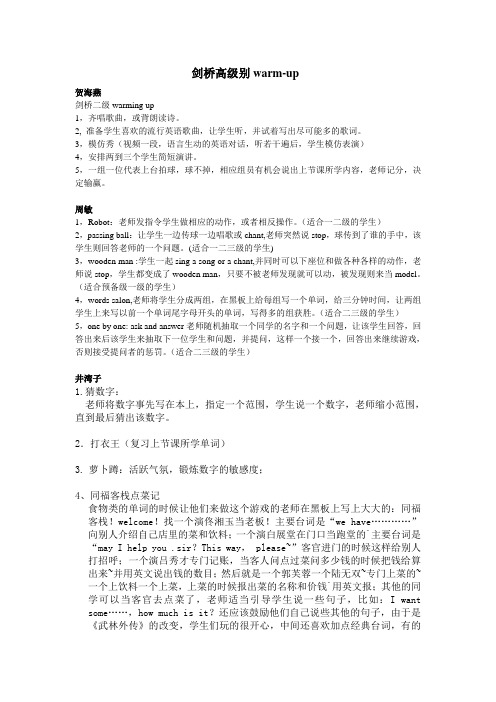
剑桥高级别warm-up贺海燕剑桥二级warming up1,齐唱歌曲,或背朗读诗。
2, 准备学生喜欢的流行英语歌曲,让学生听,并试着写出尽可能多的歌词。
3,模仿秀(视频一段,语言生动的英语对话,听若干遍后,学生模仿表演)4,安排两到三个学生简短演讲。
5,一组一位代表上台拍球,球不掉,相应组员有机会说出上节课所学内容,老师记分,决定输赢。
周敏1,Robot:老师发指令学生做相应的动作,或者相反操作。
(适合一二级的学生)2,passing ball:让学生一边传球一边唱歌或chant,老师突然说stop,球传到了谁的手中,该学生则回答老师的一个问题。
(适合一二三级的学生)3,wooden man :学生一起sing a song or a chant,并同时可以下座位和做各种各样的动作,老师说stop,学生都变成了wooden man,只要不被老师发现就可以动,被发现则来当model。
(适合预备级一级的学生)4,words salon,老师将学生分成两组,在黑板上给每组写一个单词,给三分钟时间,让两组学生上来写以前一个单词尾字母开头的单词,写得多的组获胜。
(适合二三级的学生)5,one by one: ask and answer老师随机抽取一个同学的名字和一个问题,让该学生回答,回答出来后该学生来抽取下一位学生和问题,并提问,这样一个接一个,回答出来继续游戏,否则接受提问者的惩罚。
(适合二三级的学生)井湾子1.猜数字:老师将数字事先写在本上,指定一个范围,学生说一个数字,老师缩小范围,直到最后猜出该数字。
2.打衣王(复习上节课所学单词)3.萝卜蹲:活跃气氛,锻炼数字的敏感度;4、同福客栈点菜记食物类的单词的时候让他们来做这个游戏的老师在黑板上写上大大的:同福客栈!welcome!找一个演佟湘玉当老板!主要台词是“we have…………”向别人介绍自己店里的菜和饮料;一个演白展堂在门口当跑堂的`主要台词是“may I help you .sir?This way,please~”客官进门的时候这样给别人打招呼;一个演吕秀才专门记账,当客人问点过菜问多少钱的时候把钱给算出来~并用英文说出钱的数目;然后就是一个郭芙蓉一个陆无双~专门上菜的~一个上饮料一个上菜,上菜的时候报出菜的名称和价钱`用英文报;其他的同学可以当客官去点菜了,老师适当引导学生说一些句子,比如:I want some……,how much is it?还应该鼓励他们自己说些其他的句子,由于是《武林外传》的改变,学生们玩的很开心,中间还喜欢加点经典台词,有的同学看菜太贵了还说“饿滴神啊!!”5、有黏性的胳膊目的:熟悉和区分I like...以及He\She likes...及其相应的否定形式。
(完整版)新编跨文化交际英语教程翻译1-10单元
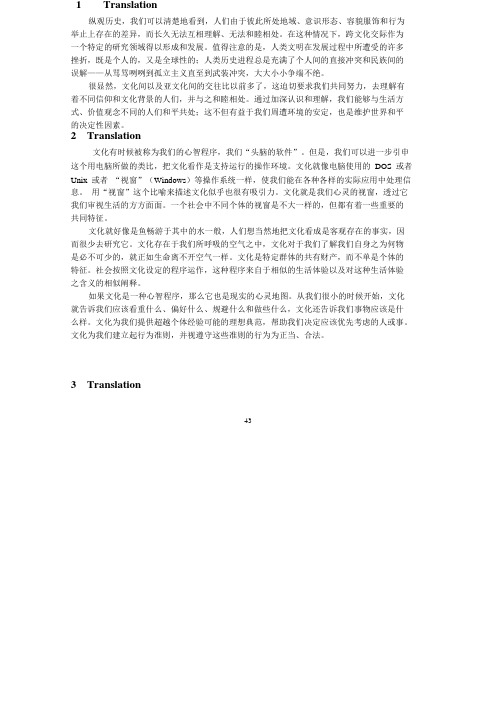
1 Translation纵观历史,我们可以清楚地看到,人们由于彼此所处地域、意识形态、容貌服饰和行为举止上存在的差异,而长久无法互相理解、无法和睦相处。
在这种情况下,跨文化交际作为一个特定的研究领域得以形成和发展。
值得注意的是,人类文明在发展过程中所遭受的许多挫折,既是个人的,又是全球性的;人类历史进程总是充满了个人间的直接冲突和民族间的误解——从骂骂咧咧到孤立主义直至到武装冲突,大大小小争端不绝。
很显然,文化间以及亚文化间的交往比以前多了,这迫切要求我们共同努力,去理解有着不同信仰和文化背景的人们,并与之和睦相处。
通过加深认识和理解,我们能够与生活方式、价值观念不同的人们和平共处;这不但有益于我们周遭环境的安定,也是维护世界和平的决定性因素。
2 Translation文化有时候被称为我们的心智程序,我们“头脑的软件”。
但是,我们可以进一步引申这个用电脑所做的类比,把文化看作是支持运行的操作环境。
文化就像电脑使用的DOS或者Unix或者“视窗”(Windows)等操作系统一样,使我们能在各种各样的实际应用中处理信息。
用“视窗”这个比喻来描述文化似乎也很有吸引力。
文化就是我们心灵的视窗,透过它我们审视生活的方方面面。
一个社会中不同个体的视窗是不大一样的,但都有着一些重要的共同特征。
文化就好像是鱼畅游于其中的水一般,人们想当然地把文化看成是客观存在的事实,因而很少去研究它。
文化存在于我们所呼吸的空气之中,文化对于我们了解我们自身之为何物是必不可少的,就正如生命离不开空气一样。
文化是特定群体的共有财产,而不单是个体的特征。
社会按照文化设定的程序运作,这种程序来自于相似的生活体验以及对这种生活体验之含义的相似阐释。
如果文化是一种心智程序,那么它也是现实的心灵地图。
从我们很小的时候开始,文化就告诉我们应该看重什么、偏好什么、规避什么和做些什么,文化还告诉我们事物应该是什么样。
文化为我们提供超越个体经验可能的理想典范,帮助我们决定应该优先考虑的人或事。
新编跨文化交际英语教程(许力生) 课后翻译

1.纵观历史,我们可以清楚地看到,各民族与文化由于彼此所处地域、意识形态、容貌服饰和行为举止上存在的差异,而长久无法互相理解,无法和睦相处。
在这种情况下,跨文化交际作为一个特定的研究领域得以形成和发展。
值得注意的是,人类文明在发展过程中所遭受的许多挫折,既是个人的,又是全球性的;人类历史进程总是充满了个人间的直接冲突和民族间的误解--从骂骂咧咧到孤立主义甚至到武装冲突,大大小小争端不绝。
很显然,文化间以及亚文化间的交往日益增多,这迫切要求我们共同努力,去理解与我们有着天壤之别信仰和文化背景的人们,并与之和睦相处。
通过加深认识和理解,我们能够与生活方式、价值观念不同的人们和平共处;这不但有益于我们周遭环境的安定,也是维护世界和平的决定性因素。
2.文化有时候被称为我们的心智程序,也即我们“头脑的软件”。
但是,我们可以进一步引申这个用电脑所做的类比,把文化看作是支持软件运行的操作环境。
文化就像电脑使用的DOS或者Unix或者“视窗”(Windows)等操作系统一样,使我们能在各种各样的实际应用中处理信息。
用“视窗”这个比喻来描述文化似乎也很有吸引力。
文化就是我们心灵的视窗,透过它我们可以审视生活的方方面面。
一个社会中不同个体的视窗是大不一样的,但都有着一些重要的共同特征。
文化就好像是鱼畅游于其中的水一般,人们想当然地把文化看成是客观存在的事实,从而很少去研究它。
文化存在于我们所呼吸的空气之中,文化对我们了解自我是必不可少的,就正如生命离不开空气一样。
文化是特定群体的共有财产,而不单是个体的特征。
社会按照文化设定的程序来运作,这种程序来自于相似的生活体验以及对这种生活体验之涵义的相似性阐释。
如果文化是一种心智程序,那么它也是现实的心灵地图。
从我们很小的时候开始,文化就告诉我们应该看重什么、偏好什么、规避什么以及做些什么。
文化还告诉我们事物应该是什么样的。
文化为我们提供超越个体经验的理想典范,帮助我们决定应该优先考虑什么。
跨文化交际Unit4I

Yellow
Royalty, power, Erotic, sensual
Erotic, sensual, funk, sneak, spiritless
Green
Young, knightly, shameful
Young, fresh, new, lack of experience, wealth, money,
be unjustly blamed 5.filthy books
• blue book
• a blue Monday • a white lie • a green wound
• red-letter days
• 蓝皮书(美)刊 载知名人士的书
• 倒霉的星期一 • 善意的谎言
• 新伤,未痊愈的 伤口
Nobility, dignity,
Pink
Few connotations
Homosexual, the best condition
Chinese Zodiac
mouse
ox
tiger
rabbit
dragon
snake
Chinese Zodiac
horse
sheep
monkey
rooster
docile and weak
food
clever, agile and a little African-Americans
impatient
prostitute
strong and proud
dog
ቤተ መጻሕፍቲ ባይዱ
humble
love
dirty, eats a lot, selfish
pig
stupid, lazy, dirty
跨文化商业营销

(3) The Failure of Carrefour in Japan—Adaptability Interviewer: As one of the world’s leading retail chains, Carrefour runs numerous operations in many parts of the world, but it didn’t do too well in Japan. Can you explain the very secret reasons for this? Jean-Luc Chéreau: I think they failed in Japan because they misunderstood the business culture and they misunderstood their clientele. They should have studied the market more carefully. Interviewer: They should have done more research into the Japanese retail market before its entrance? Jean-Luc Chéreau: Not enough yet. Japanese consumers
David: No kidding. We’ve got to come up with two completely different sales pitches to suit the needs of each
(2) What attracts me? Service Guider: Can I help you, Miss? Tracy Britton: Yes, I want to buy a toothpaste, but I can’t find…. Service Guider: What kind of products would like to? Tracy Britton: Well, it would be better if it can alleviate my tooth pain? Service Guider: How about this one? it centers on the tooth pain caused by excessive internal heat. Tracy Britton: It sounds good. But this is not the brand that I want. Where is Colgate? Service Guider: This way please…Miss, would you like to tell
新编阿拉伯语第四册课文与会话翻译 第九课

第九课冬日顽疾——流感会话千金买药不如一文预防我们现在在一家门诊室,这儿我们听到病人穆尼尔与女护士沙发尔间的谈话。
孩子你怎么了?我怎么听不到你的声音?你的双腿为什么站不住了?安拉保佑你,过来,到这儿在观察床上休息一下。
医生马上就过来给你做检查了。
现在告诉我你怎么了?我的头快要炸了,全身都疼,并且我觉得时冷时热,从昨晚上就这样了,就是在我从电影院回家之后。
电影好看吗?电影放映期间电影院里面暖和吗?是封闭的吗?电影十分精彩,电影院里挤满了人,甚至有的人都找不到座位,只好站着看电影。
尽管如此,专注于电影使人们忘记了冬日的严寒。
当你们从电影院出来后,外面的天气怎么样?天气冷极了,我们迅速的上了车,汽车行驶时一直关着窗以避免严寒。
我到家后,疼痛向我袭来,我便飞快的爬上床。
这样的话,你没有必要做检查了,你从流感患者那里传染了流感,电影院和车厢是最容易染上流感的地方。
可能就是这样吧。
更为最糟糕的是,你们忽然从电影院走到寒冷的大街上,然后如你所说,上了汽车。
所有的这些环境都易于染上流感。
但是病人怎么能去电影院里传播疾病呢?何况他得的是流感?孩子,传播疾病的人不一定是流感患者,我跟你说过和你一起看电影的人当中有人携带疾病,而那些携带这一病症的人在他传播疾病的时候不一定有症状。
因为疾病是有潜伏期的,然后症状才会显现,而不同的人的潜伏期的时间长短也不同。
那我们怎么区分携带疾病的人与没携带疾病的人呢?这个只有通过医学检查才能知道。
根据检查的结果,医生会在症状发生前治疗疾病,当然这是对病人来说也是最好的。
你的意思是在疾病发作前治病要比发作后治更好吗?是的。
首先是预防。
有句谚语:千金买药不如一文预防。
而最重要的预防方法就是避免与远离病源,比如温度大幅度变化,使用病人用过的工具,这些工具是必须要消毒的。
我听奶奶说一个人如果得了一种病后,他这辈子就不会再得这个病。
这话对吗?如果这一幻想是真的的话你就不会得流感了。
最准确的说法是预防疾病的方式有很多,你可以借助疫苗,通过给健康的身体打一针后预防并消除疾病。
新编跨文化交际英语教程1~7单元翻译
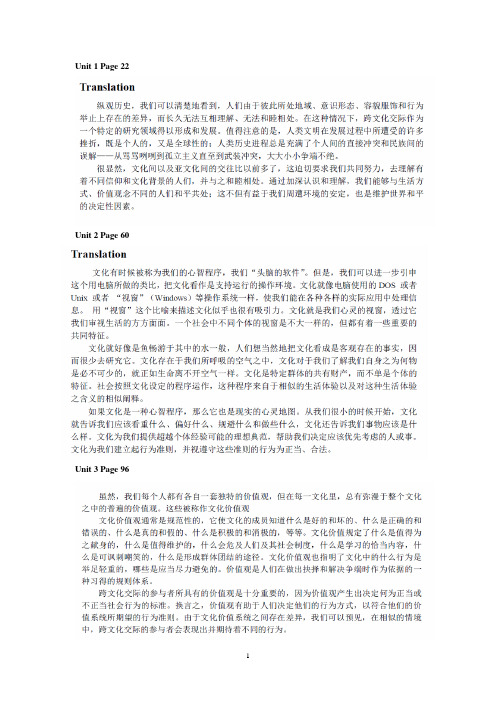
Unit 2 Page 60 Unit 3 Page 96Unit 5 Page 175 Unit 6 Page 215Case 2A common cultural misunderstanding in classes involves conflicts between what is said to be direct communication style and indirect communication style. In American culture, people tend to say what is on their minds and to mean what they say. Therefore, students in class are expected to ask questions when they need clarification. Mexican culture shares this preference of style with American culture in some situations, and that‘s why the students from Mexico readily adopted the techniques of asking questions in class. However, Korean people generally prefer indirect communication style, and therefore they tend to not say what is on their minds and to rely more on implications and inference, so as to be polite and respectful and avoid losing face through any improper verbal behavior. As is mentioned in the case, to many Koreans, numerous questions would show a disrespect for the teacher, and would also reflect that the student has not studied hard enough.Case 3The conflict here is a difference in cultural values and beliefs. In the beginning, Mary didn’t realize that her Dominican sister saw her as a member of the family, literally. In the Dominican view, family possessions are shared by everyone of the family. Luz was acting as most Dominican sisters would do in borrowing without asking every time. Once Mary understood that there was a different way of looking at this, she would become more accepting. However, she might still experience the same frustration when this happened again. She had to find ways to cope with her own emotional cultural reaction as well as her practical problem (the batteries running out).Case 6When a speaker says something to a hearer, there are at least three kinds ofmeanings involved: utterance meaning, speaker’s meaning and hearer’s meaning. In the dialogue, when Litz said ‘How long is she going to stay?’ she meant to say that if she knew how long her mother-in-law was going to stay in Finland, she would be able to make proper arrangements for her, such as taking her out to do some sightseeing. However, her mother-in-law overheard the conversation, and took Litz’s question to mean “Litz does not want me to stay for long”. From the Chinese point of view, it seems to be inappropriate for Litz to ask such a question just two days after her mother-in-law’s arrival. If she feels she has to ask the question, it would be better to ask some time later and she should not let her mother-in-law hear it.Case 7Keiko insists on giving valuable gifts to her college friends, because in countries like Japan, exchanging gifts is a strongly rooted social tradition. Should you receive a gift, and don’t have one to offer in return, you will probably create a crisis. If not as serious as a crisis, one who doesn’t offer a gift in return may be considered rude or impolite. Therefore, in Japan, gifts are a symbolic way to show appreciation, respect, gratitude and further relationship.Keiko obviously has taken those used items from Mary, Ed and Marion as gifts, for she probably doesn’t know that Americans frequently donate their used household items to church or to the community. Mary, Ed and Marion would never consider those used household items given to Keiko as gifts. No wonder they felt very uncomfortable when they received valuable gifts in return.Case 10In Japan, a company is often very much like a big family, in which the manger(s) will take good care of the employees and the employees are expected to devote themselves to the development of the company and, if it is necessary, to sacrifice their own individual interests for the interests of the company, from which, in the long run, the employees will benefit greatly. But for the French, a company is just a loosely- knit social organization wherein individuals are supposed to take care of themselves and their families. Moreover, the way the French make decisions in the family might also be different from the typical Japanese one, which may not often involve females and the power to decide usually lies with the dominating male. As there are such cultural differences between the Japanese and the French, Mr. Legrand’s decision made Mr. Tanaka feel dumbfounded.Case 12In this case, it seems that the Chinese expectations were not fulfilled. First, having two people sharing host responsibilities could be somewhat confusing to the hierarchically minded Chinese. Second, because age is often viewed as an indication of seniority, the Chinese might have considered the youth of their Canadian hosts as slight to their own status. Third, in China, it is traditional for the host to offer a welcome toast at the beginning of the meal, which is the reciprocated by the guests; by not doing so, the Canadian might be thought rude. The abrupt departure of the Chinese following the banquet was probably an indication that they were not pleased with the way they were treated. The Canadians’ lack of understanding of the Chinese culture and the Chinese ways of communication clearly cost them in their business dealings with the visiting delegation.Case 17When these two men separate, they may leave each other with very different impressions.Mr Richardson is very pleased to have made the acquaintance of Mr Chu and feels they have gotten off to a very good start. They have established their relationship on a first-name basis and Mr Chu’s smile seemed to indicate that he will be friendly and easy to do business with. Mr Richardson is particularly pleased that he had treated Mr Chu with respect for his Chinese background by calling him Hon-fai rather than using the western name, David, which seemed to him an unnecessary imposition of western culture.In contrast, Mr Chu feels quite uncomfortable with Mr Richardson. He feels it will be difficult to work with him, and that Mr Richardson might be rather insensitive to cultural differences. He is particularly bothered that, instead of calling him David or Mr Chu, Mr Richardson used his given name, Hon-fai, the name rarely used by anyone, in fact. It was this embarrassment which caused him to smile. He would feel more comfortable if they called each other Mr Chu and Mr Richardson. Nevertheless, when he was away at school in North America he learned that Americans feel uncomfortable calling people Mr for any extended period of time. His solution was to adopt a western name. He chose David for use in such situations.Case 19Talking about what’s wrong is not easy for people in any culture, but people in high-context countries like China put high priority on keeping harmony, preventing anyone from losing face, and nurturing the relationship. It seems that Ron Kelly had to learn a different way of sending message when he was in China. At home in Canada he would have gone directly to the point. But in China, going directly to the problem with someone may suggest that he or she has failed to live up to his or her responsibility and the honor of his or her organization is in question. In high-context cultures like China, such a message is serious and damaging. In low-context cultures, however, the tendency is just to “spit it out”, to get it into words and worry about the result later. Senders of unwelcome messages use objective facts, assuming, as with persuasion, that facts are neutral, instrumental, and impersonal. Indirectness is often the way members of high-context cultures choose to communicate about a problem. Case 21Sometimes our best intentions can lead to breakdowns (故障)in cross-cultural communication. For example, one of the very common manners of touching --- handshaking --- may result in conflict when performed with no consideration of cultural differences. Among middle-class North American men, it is customary to shake hands as a gesture of friendship. When wanting to communicate extra friendliness, a male in the United States may, while shaking hands, grasp with his left hand his friend’s right arm. However, to people of Middle Eastern countries, the left hand is profane (亵渎的) and touching someone with it is highly offensive. Therefore, in Vernon’s eyes, Kenneth was actually an extremely offensive message to him. Case 22In Puerto Rican culture, as in some other Latin American and Eastern cultures, it is not right for a child to keep an eye-contact with an adult who is accusing him or her, while in the United States, failing of meeting other person’s eye accusing him or her would be taken as a sign of guiltiness. As the principal knew little about this cultural difference in using eye-contact, he decided that the girl must be guilty. Generallyspeaking, avoiding eye-contact with the other(s) is often considered as an insult in some cultures, but may signify respect for authority and obedience in other cultures. Case 25For people from the American culture and western European cultures, one’s time should be scheduled into segments or compartments which are to be kept discrete from one another. They prefer to do one thing at a time. They will be annoyed when they have made an appointment with somebody, only to find a lot of other things going on at the same time. They don’t like to interrupt others and be interrupted by other while they are doing something. In contrast, people from many other cultures including the Chinese culture are more likely to operate with several people, ideas, or matters simultaneously. They are more easily distracted and subject to interruptions, which they would not usually mind very much. The miscommunication between Katherine and the director can be ascribed to their lack of knowledge about each other’s way of using time.In this case, to the Chinese director as well as many other Chinese people, it is natural to handle the other things which needed to be dealt with immediately. He may have thought that, in this way, he utilized the time best. But to Katherine and most Westerners, it’s quite different. They tend to do things strictly according to their schedule and appointments with others, which is their concept of using time best.高语境交流和低语境交流(由高到低排列)Japanese, Chinese, Korean, African American, Native American, Arab, Greek, Latin,Italian,English,Frech,Amercian,Scandinavian,German,German-Swiss。
新编跨文化交际英语教程cases参考答案 中英文版
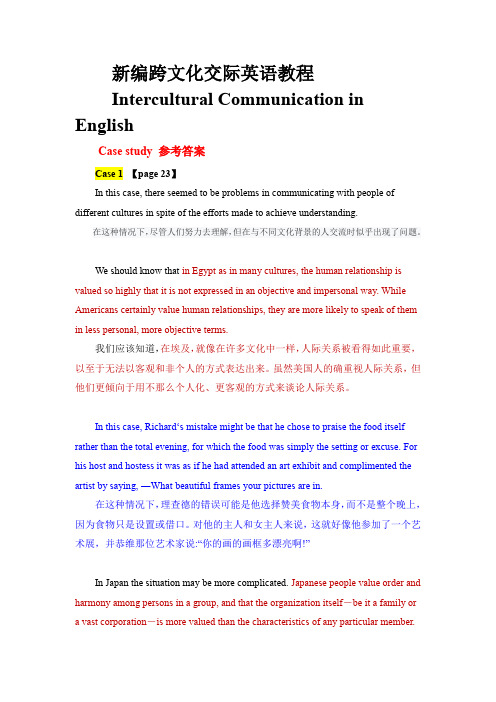
新编跨文化交际英语教程Intercultural Communication in EnglishCase study 参考答案Case 1 【page 23】In this case, there seemed to be problems in communicating with people of different cultures in spite of the efforts made to achieve understanding.在这种情况下,尽管人们努力去理解,但在与不同文化背景的人交流时似乎出现了问题。
We should know that in Egypt as in many cultures, the human relationship is valued so highly that it is not expressed in an objective and impersonal way. While Americans certainly value human relationships, they are more likely to speak of them in less personal, more objective terms.我们应该知道,在埃及,就像在许多文化中一样,人际关系被看得如此重要,以至于无法以客观和非个人的方式表达出来。
虽然美国人的确重视人际关系,但他们更倾向于用不那么个人化、更客观的方式来谈论人际关系。
In this case, Richard‘s mistake might be that he chose to praise the food itself rather than the total evening, for which the food was simply the setting or excuse. For his host and hostess it was as if he had attended an art exhibit and complimented the artist by saying, ―What beautiful frames your pictures are in.在这种情况下,理查德的错误可能是他选择赞美食物本身,而不是整个晚上,因为食物只是设置或借口。
跨文化交际_Unit_2_参考翻译

Unit Two Task 11)A smooth sea never made a skillful mariner. 平静的大海决不能造就出熟练的水手。
/花盆里生长不出参天大树。
/温室里长不出栋梁之才。
2)He who would search for pearls must dive below.不入虎穴,焉得虎子。
/ 欲寻珍珠就要潜到水里。
/ 欲寻珍珠欲潜入水。
3)Living without an aim is like sailing without a compass. 生活没有目标如同航行没有罗盘。
/没有目标的生活如同没有罗盘的航行。
4)To have another fish to fry另有要事/ 另有事情得做5)The water that bears the boat is the same that swallows it up.水能载舟,亦能覆舟。
(The same knife cuts bread and fingers.)6)前人栽树,后人乘凉。
One sows and another reaps. / One man sows and another reaps. / One generation plants the trees in whose shade another generation rests. / The precedence planted, the later generations enjoy its cool.7)斩草不除根,逢春又发青。
If the grass is only cut, then the next spring it will revive. / Cut weeds and dig up the roots.8)种田不用问,深耕多上粪。
Planting has no better measures but ploughing deeply and fertilizing much more.9)生米煮成熟饭。
Warm up

Warm up培训流程一、培训时间:1.5小时二、Warm up的作用:活跃课堂气氛,让学生更快融入课堂;调整课堂纪律;课前的热身。
三、Warm up的要求:warm up的动作要到位,有力度,表情要丰富,所选内容尽量与教学内容相联系,起到辅助教学的作用;内容要新颖。
四、培训warm up的目的:让新老师学会以下十个warm up,能灵活运用于课堂教学,同事训练新老师的肢体协调性。
五、培训步骤:1.Show it 培训老师先做一遍,新老师注意听和看2.Teach step by step 培训老师一步一步的教授新老师动作及内容3.Do it together 新老师在培训老师的指引下一起做warm up(备注:在教授的时候要与新老师互动,让新老师能在愉快的环境下迅速记下所培训的内容)六、warm up内容:1.eyes, eyes, tra, tra, tra; eyes, eyes, tra, tra, traears, ears, ah, ah, ah; ears ,ears, ah, ah, ahnoses, noses, 嗅三下,做难闻状;noses,noses,嗅三下,做难闻状mouth,mouth, ma, ma, ma; mouth, mouth, ma, ma, mahips, hips, bu, bu, bu; hips, hips, bu, bu, bu2. I’m really wonderfulI’m really wonderfulI’m really wonderfulI’m really really really really really wonderful做三遍,速度逐渐递增(这个warm up可在教授单词wonderful或be动词,人称代词使用)3.Happy chantHappy happy happy everydayLa la la la la laHappy everyday做三遍,速度逐渐递增(这个warm up可以在教授单词happy或教表情的时候联系使用)4.Big thumb upBig thumb upBig thumb downMake a circleTurn around做三遍,速度逐渐递增(这个warm up可以在教授thumb或up/down的时候联系使用)5.Walking walkingWalking Walking Walking WalkingJump Jump Jump, Jump Jump JumpRunning Running Running, Running Running Running Now we stop, now we stop(这个warm up可以在教授诸如walk等动作动词时联系使用)6.I jump , I hopI jump I hop, I run run runI jump I hop, I play play playI jump I hop, I turn aroundI jump I hop, I quickly sit down(老师可以说:I take out my gun,biang biang biang! )(这个warm up可以在教授jump,hop,play,run及sit down, turn around等动作短语时联系使用)7.Happy happy ha ha haCry cry en en en(做哭状)Angry angry heng heng heng(做生气状)Shy shy en en en(做害羞状)8.I am singer ohlailai,ohlailaiI am dancer bengcaca,bengcacaI am farmer heixiuxiu,heixiuxiuI am Soldier one two three four9.Animal chantDog dog , walk walk walkBird bird , fly fly flyPig pig , sleep sleep sleepRabbit rabbit , jump jump jump (这个warm up可在动物单词教学联系使用)10.F amily chantFarher father, read read readMother mother, cook cook cookDoctor doctor, hear hear hearNurse nurse, shoot shoot shoot(老师最后shoot 一下,学生全部倒地,然后用纪律口号再让学生迅速归位)以上就是培训的新老师必须要掌握的最基本的是个warm up,在教学中,根据每节课的内容不同,需要不同的warm up,掌握这是个是远远不够的,所以新老师需要不断学习更多的warm up来丰富自己的教学。
《跨文化交际与翻译》language and communication
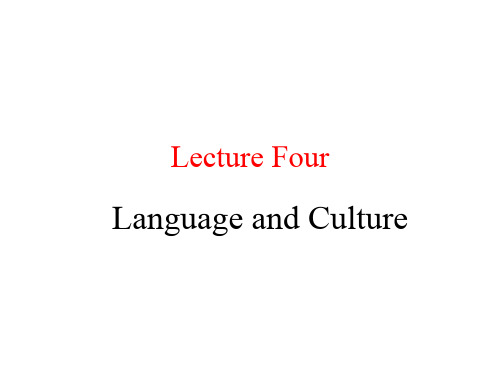
Case study: Use one of Hofstede's four dimension to explain the following case.
• When my boss came into my office for the first time, I stood up immediately to show my respect. The boss misunderstood my behavior, thought I was going out,and said he would talk with me in a while. I was accustomed to respecting all those in authority. On one occasion, I offered my seat to the Head of the Department of Internal Medicine. He said “Thanks” and sat down. During the conference,he kept turning around and looking at me, which made me feel ill at ease. When the conference was over, he came over and apologized to me,“I thought you were leaving the conference.You don't have to offer me.”
Language most shows a man. Speak, that I may see thee.
---- Ben Johnson
The limits of my language are the limits of my world.
【精选】跨文化交际课程unit4
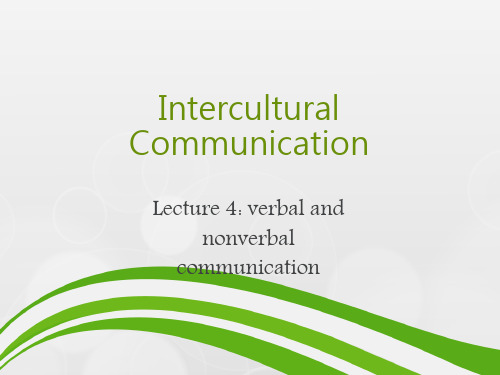
Roger was confused by Rosalita's behavior. Could you give him an explanation ?
Comment
The problem resulted from the misunderstanding of the word "hustle".
Question:
Why did the Italian shop owner make such a mistake ?
Case 2
Roger was the Personnel Executive (人事执行员) of a large American multinational firm. In 1996, Roger was working in Brazil to help promote their business. One evening, there was a party, attended by both his employees from the United States and many Brazilian business people. At the party, Roger bumped into Rosalita, a Brazilian woman he had known for some time. Roger generally had a very good impression of Rosalita and always felt at ease with her, so that he felt free to tell jokes and share personal thoughts, and talk about Brazil and Brazilian life without having the worries of offending Rosalita.
(完整word版)新编跨文化交际英语教程课文翻译
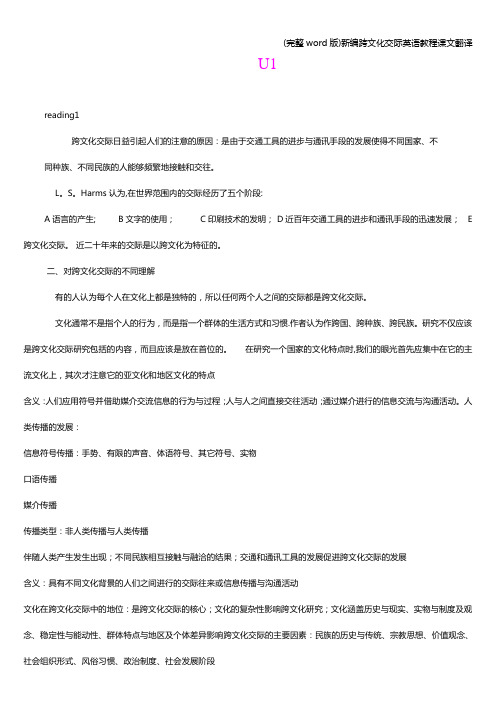
U1reading1跨文化交际日益引起人们的注意的原因:是由于交通工具的进步与通讯手段的发展使得不同国家、不同种族、不同民族的人能够频繁地接触和交往。
L。
S。
Harms认为,在世界范围内的交际经历了五个阶段:A语言的产生; B文字的使用; C印刷技术的发明; D近百年交通工具的进步和通讯手段的迅速发展; E 跨文化交际。
近二十年来的交际是以跨文化为特征的。
二、对跨文化交际的不同理解有的人认为每个人在文化上都是独特的,所以任何两个人之间的交际都是跨文化交际。
文化通常不是指个人的行为,而是指一个群体的生活方式和习惯.作者认为作跨国、跨种族、跨民族。
研究不仅应该是跨文化交际研究包括的内容,而且应该是放在首位的。
在研究一个国家的文化特点时,我们的眼光首先应集中在它的主流文化上,其次才注意它的亚文化和地区文化的特点含义:人们应用符号并借助媒介交流信息的行为与过程;人与人之间直接交往活动;通过媒介进行的信息交流与沟通活动。
人类传播的发展:信息符号传播:手势、有限的声音、体语符号、其它符号、实物口语传播媒介传播传播类型:非人类传播与人类传播伴随人类产生发生出现;不同民族相互接触与融洽的结果;交通和通讯工具的发展促进跨文化交际的发展含义:具有不同文化背景的人们之间进行的交际往来或信息传播与沟通活动文化在跨文化交际中的地位:是跨文化交际的核心;文化的复杂性影响跨文化研究;文化涵盖历史与现实、实物与制度及观念、稳定性与能动性、群体特点与地区及个体差异影响跨文化交际的主要因素:民族的历史与传统、宗教思想、价值观念、社会组织形式、风俗习惯、政治制度、社会发展阶段case1主角被埃及人邀请去家里吃丰盛的大餐,他用餐后说食物很好.在这种情况下,理查德错误可能是他选择赞美食物本身,而不是整个晚上,的食物.他的主人和女主人就好像他参加了一个艺术展,称赞这位艺术家说:多么美丽的你的照片。
在日本工作的时候他犯了一个错,开会的时候解释试图让大家明白每个人也许都会跟他一样以减轻罪过,结果又错了.相比之下,美国人强调个性价值和容易维护个体差异时,他们似乎理由与组织的目标或价值观冲突.在这种情况下:理查德…年代错误是在努力保护自己.case2对于学生来说,向老师提问很多问题是不尊重的,另一方面,提问一些跟老师说的无关的也如此,代表你没有听课。
新编跨文化交际英语教程1-6单元翻译(Word可编辑版)

纵观历史,我们可以清楚地看到,人们由于彼此所处地域、意识形态、容貌服饰和行为举止上存在的差异,而长久无法互相理解、无法和睦相处。
在这种情况下,跨文化交际作为一个特定的研究领域得以形成和发展。
值得注意的是, 人类文明在发展过程中所遭受的许多挫折, 既是个人的, 又是全球性的: 人类历史进程总是充满了个人问的直接冲突和民族间的误解一一从骂骂咧咧到孤立主义直至到武装冲突, 大大小小争端不绝。
很显然, 文化间以及亚文化问的交往比以前多了, 这迫切要求我们共同努力, 去理解有着不同信仰和文化背景的人们, 并与之和睦相处。
通过加深认识和理解, 我们能够与生活方式、价值观念不同的人们和平共处: 这不但有益于我们周遭环境的安定, 也是维护世界和平的决定性因素。
Translation Unit 2文化有时候被称为我们的心智程序, 我们“头脑的软件”。
但是, 我们可以进一步引中这个用电脑所做的类比, 把文化看作是支持运行的操作环境。
文化就像电脑使用的Dos 或者unix 或者“视窗”(windows) 等操作系统一样, 使我们能在各种各样的实际应用中处理信息。
用“视窗”这个比喻来描述文化似乎也很有吸引力。
文化就是我们心灵的视窗,透过它我们审视生活的方方面面。
一个社会中不同个体的视窗是不大一样的, 但都有着一些重要的共同特征。
文化就好像是鱼畅游于其中的水一般, 人们想当然地把文化看成是客观存在的事实, 因而很少去研究它。
文化存在于我们所呼吸的空气之中, 文化对于我们了解我们自身之为何物是必不可少的, 就正如生命离不开空气一样。
文化是特定群体的共有财产, 而不单是个体的特征。
社会按照文化设定的程序运作, 这种程序来自于相似的生活体验以及对这种生活体验之含义的相似阐释。
如果文化是一种心智程序, 那么它也是现实的心灵地图。
从我们很小的时候开始, 文化就告诉我们应该看重什么、偏好什么、规避什么和做些什么, 文化还告诉我们事物应该是什么样。
- 1、下载文档前请自行甄别文档内容的完整性,平台不提供额外的编辑、内容补充、找答案等附加服务。
- 2、"仅部分预览"的文档,不可在线预览部分如存在完整性等问题,可反馈申请退款(可完整预览的文档不适用该条件!)。
- 3、如文档侵犯您的权益,请联系客服反馈,我们会尽快为您处理(人工客服工作时间:9:00-18:30)。
1、【communication across cultures】Chapter One Conceptual Foundation【跨文化沟通】第一章概念的基础Why study intercultural communication?为什么学习跨文化交际?There is a folk tale that comes to us from the foothills of the Himalayas. A man was trying to explain to a blind friend what colors are. He began with the color White.有一个民间的故事,来自于喜马拉雅山的山麓。
一名男子试图解释一个盲人朋友的颜色是什么。
他开始与雪白的颜色。
“Well,”he said, “it is like snow on the hills.”“嗯,”他说,“这就像雪在山上。
”“Oh,”the blind man said, “then it must be a wet and dampish sort of color, isn’t it? ”“No, no,”the man said, “it is also the same color as cotton or wool. ”“Oh yes, I understand. It must be fluffy color. ”“No, it is also like paper.”“哦,”盲人说,“那一定是湿,微湿的颜色,不是吗?”“不,不,”那人说,“这也是相同的颜色,棉或羊毛。
”“哦,是的,我明白了。
一定是毛茸茸的颜色。
”“不,它也像纸。
”“Then it must be a crackling or fragile color,”said the blind man. “No, not at all. It is also like china.”“那一定是脆皮或脆弱的颜色,”瞎子说。
“不,不是。
也喜欢中国。
”2 讲【culture and communication讲文化和沟通An American university student Tom is active in a foreign student club at his university and has several good friends from different countries. One of them tells Tom his parents and sister will be visiting, and he asks Tom if he would like to meet them. Tom invites all of them to visit his home one afternoon.They arrive and present him with a nicely wrapped gift. Tom tells them they shouldn’t have brought anything, but thanks them and proceeds to open the gift, which turns out be very pretty vase from their country. He thanks them again. He sense some awkwardness and realizes that he has not offered them anything to drink.“Would you like coffee or tea or a soft drink?”he asks. They all refuse. Things seem more awkward now. But he talks a little of their country, about studies at the university, about the cost of living, and everything the father whispers something to his son.“I think we must be leaving to return to the hotel,”he says. Everybody stands up, shake hands, and they start to leave. “Please come and visit again,”Tom says as he stands and watches the family walk to the door, open it and disappear down the hall. Two days later, in a very indirect way, Tom learns from another friend that the visitors thought he was a rude host一个美国大学的学生汤姆是活跃在他大学的外国学生俱乐部,有几个来自不同国家的好朋友。
其中一人告诉汤姆他的父母和妹妹将访问,他问汤姆是否想见到他们。
汤姆邀请他们参观他的家的一个下午。
他们到达,给他一个包装精美的礼物。
汤姆告诉他们他们不带来任何东西,但由于他们,继续打开礼物,这证明是非常漂亮的花瓶从他们的国家。
他再次感谢他们。
他感觉有些尴尬,意识到他没有给他们任何东西喝。
“你想要咖啡还是茶还是饮料?”他问道。
他们都拒绝。
事情似乎更尴尬的了。
但他的小国家,谈论研究大学,生活费用,父亲低声说些儿子的一切。
“我认为我们必须离开回到酒店,”他说。
每个人都站起来,握手,他们开始离开。
“请再来拜访,”汤姆说,他站和手表家庭走到门口,打开它,消失在大厅。
两天后,汤姆非常间接的方式,可以从另一个朋友,游客认为他是一个粗鲁的主机3讲【cultural diversity 】【文化多样性】Mr. Zhao and Mr. Qian have been on good terms with each other, though Mr. Zhao lives in China while Mr. Qian became an overseas Chinese working in the United States. The two both have children about the same age. Mr. Qian has two brothers who live in the U.S. and manage their family businesses. And both Mr. Zhao and Mr. Qian have business that seems fairly prosperous. In recent times, however, Mr. Qian is bogged down with some difficulties, and in fact, his business is almost on the rocks. But, he has an opportunity to invest in a very promising venture but at themoment does not have enough cash. He realizes that this venture will be able to help him nurse his business back, and that his two brothers do not have the large sum he needs. He weighed the situation carefully and then telephoned Mr. Zhao for help. Mr. Zhao gladly lent him the money, and the venture did turn out very profitably for Mr. Qian, who was then able to repay Mr. Zhao with the interest immediately. Later that year, when Mr. Zhao’s daughter was applying for a course in the United States, he called Mr. Qian to help to get his daughter into the college by using his connections. Mr. Qian acquiesced and secured a place for Mr. Zhao’daughter. A year later, Mr. Zhao’s nephew was going to the States. He asked Mr. Qian if his brothers could help him and give him a job when he got there. Again, Mr. Qian complied without hesitation. But when this was known by one of Mr. Qian’s American friends, Jackson, he didn’t seem to be able to understand all the assistance Mr. Qian had given to Mr. Zhao, though Mr. Qian had told him a lot about the relation between them. Jackson said that Mr. Zhao was asking too much赵亮和钱先生一直关系不错,但赵先生生活在中国而钱先生成为海外华人在美国工作。
都有两个孩子的年龄相同。
钱先生有两个兄弟,他们住在美国和管理他们的家族企业。
赵亮和钱先生有业务,似乎相当繁荣。
然而,近年来,钱云会被一些困难,事实上,他的生意几乎是在岩石上。
但是,他有机会投资于一个非常有前途的公司,但目前没有足够的现金。
他意识到这种风险将能够帮助他护士业务回来,和他的两个兄弟没有他需要的大笔。
